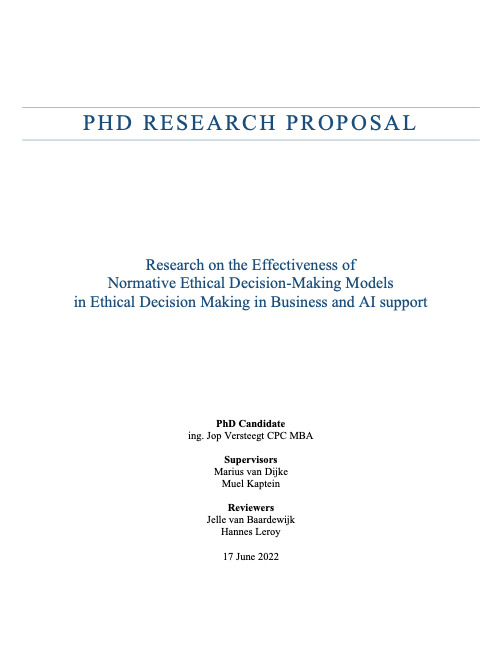PhD - research
Based on various conversations and thoughts, the research aims the following set-up.
The main research question is: Can the quality of ethical decision making in business be improved by using normative ethical decision-making models?
In more detail; is using normative ethical decision-making models (NEDM-Model) useful to answer ethical questions more in-depth? Or is answering without a model even successful? And is the design of the model depending on availability of time, experience, and purpose? Sometimes for answering the most impactful decisions it is not possible to schedule a meeting but is an almost immediate response required, will that differentiate the model used?
The fundament of the research, is based on earlier research of different models. First literature research support the statement that NEDM-Models used in business context lack scientific research and empirical testing. Interestingly when they are already used in Today’s practice.
The research is focused on individuals who are making the decisions within the company but also the group of people which are making the decision together. The empirical research will be done on an individual and collective level.
Scope: In order to avoid a very broad scope, the research is focused on business context, not that the results could be less relevant to other sectors.
Importantly, the focus is on the process of ethical decision-making. It is not about the answer to the question. Deepening the process provides more in-depth deliberation, an increase in moral awareness to potentially improve the quality of our decision-making. I also expect that the use of AI can contribute to this regard. AI can convert more data into relevant info to use for further optimization of the quality of our ethical decision-making.
To answer the research question the research is divided in four parts:
The main research question is: Can the quality of ethical decision making in business be improved by using normative ethical decision-making models?
In more detail; is using normative ethical decision-making models (NEDM-Model) useful to answer ethical questions more in-depth? Or is answering without a model even successful? And is the design of the model depending on availability of time, experience, and purpose? Sometimes for answering the most impactful decisions it is not possible to schedule a meeting but is an almost immediate response required, will that differentiate the model used?
The fundament of the research, is based on earlier research of different models. First literature research support the statement that NEDM-Models used in business context lack scientific research and empirical testing. Interestingly when they are already used in Today’s practice.
The research is focused on individuals who are making the decisions within the company but also the group of people which are making the decision together. The empirical research will be done on an individual and collective level.
Scope: In order to avoid a very broad scope, the research is focused on business context, not that the results could be less relevant to other sectors.
Importantly, the focus is on the process of ethical decision-making. It is not about the answer to the question. Deepening the process provides more in-depth deliberation, an increase in moral awareness to potentially improve the quality of our decision-making. I also expect that the use of AI can contribute to this regard. AI can convert more data into relevant info to use for further optimization of the quality of our ethical decision-making.
To answer the research question the research is divided in four parts:
|
Part 1: A review of normative ethical decision-making models
A novel review will be developed on ethical decision-making models for business. The literature research will provide answers on which NEDM-Models are available in business research literature and what relevant empirical studies are done on NEDM-Models. Based on more than 150 normative ethical decision-making models, the specific focus is on models which are published in business research papers. |
|
Part 2: The effectiveness of normative ethical decision-making models
Theory vs practice (application of models vs intuitive decision-making). Based on the outcome of the review we can start the empirical research part, by testing different ethical decision-making models. This is most likely one of the most challenging and interesting parts of the research. What happens in practice? Goal is to determine in a lab set-up and preferable also in live situations what the practical application of these models are. Are they being used? If so, how? In what situation are they relevant? What is the effect using them? And which model is more preferable in what specific situation? Challenging in the sense that we do not know yet to what extent decision models are effective at all. |
|
Part 3: Develop a new or updated NEDM-Model
The necessity of this part is depending on the outcome of the first empirical results. If the first test results conclude that no improvement of quality is measured when using an NEDM-Model or if a maximum quality result is concluded using one of the existing NEDM-Models, there is no fundament to implement this phase. If test results provides a fundament to develop a new developed or updated NEDM-model or models they will also be empirically tested in the same set-up as mentioned in part 2 with the goal to increase quality of our decision-making by using a NEDM-Model. |
|
Part 4: The added value of AI to a normative ethical decision-making model
The final (optional) part is extending the research in the field of AI. Can AI-Robots add value by their analyzing skills in improving our ethical decision-making? In case the earlier sub-studies show that there is added value to use NEDM-Models, we could continue to see where AI can provide support on the model. Which aspects can AI add based on its capabilities on data analysis and thus further improvement / optimization of the quality of a NEDM-Model? Or can AI even take over parts of the decision-making model so focus is only necessary on that specific part which cannot be done by AI-Robots. Question is if the focus in this part is restricted on the process for answering ethical questions, or even extended to the capabilities of AI Robots in answering (partly) the questions. |
PhD Research Proposal
| j.p._versteegt_phd_-_research_proposal_nedm-models_def.pdf | |
| File Size: | 476 kb |
| File Type: | |





